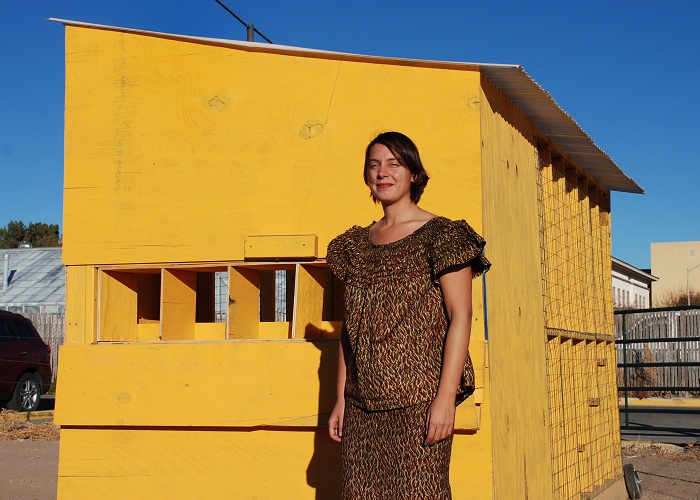Peace Corps Coverdell Fellow looks to future in sustainable agriculture

After Juliette Enfield finished her two-year Peace Corps stint in the West African nation of Togo in 2008, she returned to the U.S. and worked for a time as an intern on an organic farm. She then turned her sights toward graduate school. Ultimately interested in owning and managing an organic farm, she sought a situation that was aligned with her interests in small scale, sustainable, organic and community oriented farming.
She found the perfect fit in New Mexico State University's College of Agricultural, Consumer and Environmental Sciences, where a number of faculty members have similar interests. ACES is also one of two NMSU colleges that house the Paul D. Coverdell Fellowship Program, a collaboration between Peace Corps and participating U.S. universities designed to link high energy, committed returned Peace Corps volunteers with supportive graduate school opportunities. (The other NMSU participant is the College of Health and Social Services.)
Among the benefits to the students accepted as Fellows are in-state tuition and priority consideration for graduate assistant positions. ACES began participating in the program in 2009.
Enfield leaves NMSU after the fall semester, having completed the requirements for a master of science in horticulture through the Department of Plant and Environmental Sciences. She will be the first Coverdell Fellow to graduate from that department.
Her mentor and graduate academic adviser has been Mark Uchanski. An assistant professor of horticulture in PES, he is involved in a research project that piqued Enfield's interest as she was exploring graduate programs. He and several colleagues are assessing the viability of three designs of hoop houses - essentially low-cost greenhouses - as season-extension aids for small-scale vegetable producers in the Southwest.
As Uchanski's graduate assistant, Enfield has been involved in all aspects of crop production, monitoring and analysis at a set of hoop houses at NMSU's Leyendecker Plant Science Research Center south of the Las Cruces campus.
"Juliette did a spectacular job of managing our six hoop houses," Uchanski said. "She actually analyzed data from a total of 12 hoop houses, coordinating with six other collaborating farms in New Mexico, Arizona and Colorado."
The project became the subject of her master's thesis.
Enfield entered Peace Corps with a high level of altruism and energy and credits her experiences in Togo with strengthening a number of qualities that led to her success at NMSU, among them resourcefulness, self-reliance and persistence.
In her Togolese village, where she was a natural resources management volunteer, she was involved in development activities with small-scale farmers that included incorporating natural pesticides, windbreaks and erosion walls into their operations. Encouraging wood conservation through the use of reduced-wood cooking stoves and fostering the development of entrepreneurship and business skills in women's groups are among the other initiatives she was involved in.
"She has excelled in the pursuit of her academic degree, she actively sought out opportunities to supplement her degree, and she has served as a role model for others through her passion for sustainable horticulture," Uchanski said, looking back on Enfield's NMSU career.
One example of her willingness to go beyond her program's academic requirements was her spearheading of a recent initiative to build a mobile chicken coop also known as a "chicken tractor." Like a hoop house, a chicken tractor offers small-scale farmers an economical approach to production.
She worked with fellow students in the Horticulture Forum student group, as well as her home department, to pool together the funds needed for construction. The completed structure is likely to be incorporated into the operation of the new Student-Centered Field Laboratory west of Gerald Thomas Hall.
She has also been involved with other RPCVs at NMSU and in the region, particularly with information sessions and other recruiting activities for Peace Corps.
The next step for Enfield is to find a situation that will give her more knowledge of the business aspects of farming.
Ultimately, whether with her own farm or through involvement in some other operation, she hopes to combine her Peace Corps, NMSU and other experiences in working for more progressive agricultural practices. Community-supported agriculture, the incorporation of educational components into agricultural operations, an emphasis on food quality and protecting the environment, attention to the needs of the local community, perhaps an operation that brings in immigrants wishing to grow foods from their place of origin, all of these are on Enfield's mind as she leaves NMSU.
Such activities would most certainly be viewed by the villagers she worked with in Togo as a domestic version of what she was doing over there, a view she most certainly shares.
According to the Coverdell Fellowship website, more than 70 universities in 30 states participate in the program. The program was named after the late Sen. Paul D. Coverdell of Georgia, who directed Peace Corps from 1989-1991, prior to being elected to the Senate.
To learn more about Coverdell Fellowship opportunities at NMSU, go to: http://aces.nmsu.edu/peacecorp/fellows-usa.htmland http://chss.nmsu.edu/prospective-students/peace-corps-coverdell-fellows/.


